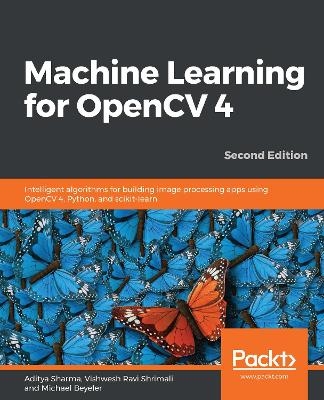
Machine Learning for OpenCV 4
Packt Publishing Limited (Verlag)
978-1-78953-630-0 (ISBN)
A practical guide to understanding the core machine learning and deep learning algorithms, and implementing them to create intelligent image processing systems using OpenCV 4
Key Features
Gain insights into machine learning algorithms, and implement them using OpenCV 4 and scikit-learn
Get up to speed with Intel OpenVINO and its integration with OpenCV 4
Implement high-performance machine learning models with helpful tips and best practices
Book DescriptionOpenCV is an opensource library for building computer vision apps. The latest release, OpenCV 4, offers a plethora of features and platform improvements that are covered comprehensively in this up-to-date second edition.
You'll start by understanding the new features and setting up OpenCV 4 to build your computer vision applications. You will explore the fundamentals of machine learning and even learn to design different algorithms that can be used for image processing. Gradually, the book will take you through supervised and unsupervised machine learning. You will gain hands-on experience using scikit-learn in Python for a variety of machine learning applications. Later chapters will focus on different machine learning algorithms, such as a decision tree, support vector machines (SVM), and Bayesian learning, and how they can be used for object detection computer vision operations. You will then delve into deep learning and ensemble learning, and discover their real-world applications, such as handwritten digit classification and gesture recognition. Finally, you’ll get to grips with the latest Intel OpenVINO for building an image processing system.
By the end of this book, you will have developed the skills you need to use machine learning for building intelligent computer vision applications with OpenCV 4.
What you will learn
Understand the core machine learning concepts for image processing
Explore the theory behind machine learning and deep learning algorithm design
Discover effective techniques to train your deep learning models
Evaluate machine learning models to improve the performance of your models
Integrate algorithms such as support vector machines and Bayes classifier in your computer vision applications
Use OpenVINO with OpenCV 4 to speed up model inference
Who this book is forThis book is for Computer Vision professionals, machine learning developers, or anyone who wants to learn machine learning algorithms and implement them using OpenCV 4. If you want to build real-world Computer Vision and image processing applications powered by machine learning, then this book is for you. Working knowledge of Python programming is required to get the most out of this book.
Aditya Sharma is a senior engineer at Robert Bosch working on solving real-world autonomous computer vision problems. At Robert Bosch, he also secured first place at an AI hackathon 2019. He has been associated with some of the premier institutes of India, including IIT Mandi and IIIT Hyderabad. At IIT, he published papers on medical imaging using deep learning at ICIP 2019 and MICCAI 2019. At IIIT, his work revolved around document image super-resolution. He is a motivated writer and has written many articles on machine learning and deep learning for DataCamp and LearnOpenCV. Aditya runs his own YouTube channel and has contributed as a speaker at the NCVPRIPG conference (2017) and Aligarh Muslim University for a workshop on deep learning. Vishwesh Ravi Shrimali graduated from BITS Pilani, where he studied mechanical engineering, in 2018. Since then, he has been working with BigVision LLC on deep learning and computer vision and is also involved in creating official OpenCV courses. He has a keen interest in programming and AI and has applied that interest in mechanical engineering projects. He has also written multiple blogs on OpenCV and deep learning on LearnOpenCV, a leading blog on computer vision. When he is not writing blogs or working on projects, he likes to go on long walks or play his acoustic guitar. Michael Beyeler is a postdoctoral fellow in neuroengineering and data science at the University of Washington, where he is working on computational models of bionic vision in order to improve the perceptual experience of blind patients implanted with a retinal prosthesis (bionic eye). His work lies at the intersection of neuroscience, computer engineering, computer vision, and machine learning. He is also an active contributor to several open source software projects, and has professional programming experience in Python, C/C++, CUDA, MATLAB, and Android. Michael received a PhD in computer science from the University of California, Irvine, and an MSc in biomedical engineering and a BSc in electrical engineering from ETH Zurich, Switzerland.
Table of Contents
A Taste of Machine Learning
Working with Data in OpenCV
First Steps in Supervised Learning
Representing Data and Engineering Features
Using Decision Trees to Make a Medical Diagnosis
Detecting Pedestrians with Support Vector Machines
Implementing a Spam Filter with Bayesian Learning
Discovering Hidden Structures with Unsupervised Learning
Using Deep Learning to Classify Handwritten Digits
Ensemble Methods for Classification
Selecting the Right Model with Hyperparameter Tuning
Using OpenVINO with OpenCV
Conclusion
| Erscheinungsdatum | 11.09.2019 |
|---|---|
| Verlagsort | Birmingham |
| Sprache | englisch |
| Maße | 75 x 93 mm |
| Themenwelt | Mathematik / Informatik ► Informatik ► Programmiersprachen / -werkzeuge |
| Informatik ► Theorie / Studium ► Künstliche Intelligenz / Robotik | |
| ISBN-10 | 1-78953-630-8 / 1789536308 |
| ISBN-13 | 978-1-78953-630-0 / 9781789536300 |
| Zustand | Neuware |
| Haben Sie eine Frage zum Produkt? |
aus dem Bereich


